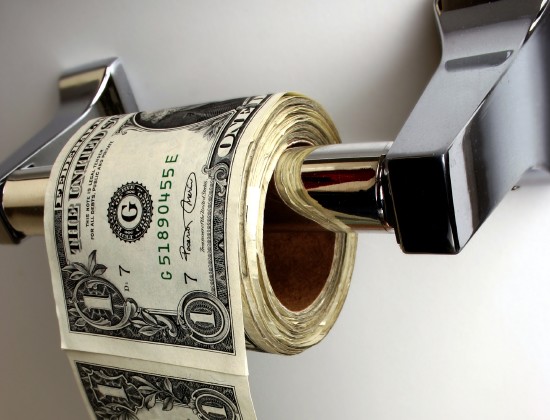
1. Set savings goals. For short-term goals, this is easy. If you want to buy a video game, find out how much it costs; if you want to buy a house, determine how much of a down payment you’ll need. For long-term goals, such as retirement, you’ll need to do a lot more planning (figuring out how much money you’ll need to live comfortably for 20 or 30 years after you stop working), and you’ll also need to figure out how investments will help you achieve your goals.
2. Kill your debt first. Simply calculating how much you spend each month on your debts will illustrate that eliminating debt is the fastest way to free up money. Once the money is freed from debt payment, it can easily be re-purposed to savings.
3. Establish a timeframe. For example: "I want to be able to buy a house two years from today." Set a particular date for accomplishing shorter-term goals, and make sure the goal is attainable within that time period. If it’s not attainable, you’ll just get discouraged.
4. Figure out how much you’ll have to save per week, per month, or per paycheck to attain each of your savings goals. Take each thing you want to save for and figure out how much you need to start saving now. For most savings goals, it’s best to save the same amount each period. For example, if you want to put a $20,000 down payment on a home in 36 months (three years), you’ll need to save about $550 per month every month. But if your paychecks amount to $1000, it might not be a realistic goal, so adjust your timeframe until you come up with an approachable amount.
5. Keep a record of your expenses. What you save falls between two activities and their difference: how much you make and how much you spend. Since you have more control over how much you spend, it's wise to take a critical look at your expenses. Write down everything you spend your money on for a couple weeks or a month. Be as detailed as possible, and try not to leave out small purchases. Assign each purchase or expenditure a category such as: Rent, Car insurance, Car payments, Phone Bill, Cable Bill, Utilities, Gas, Food, Entertainment, etc.
Keep a small notebook with you at all times. Get in the habit of recording every expense and saving the receipts.
Sit down once a week with your small notebook and receipts. Record your expenses in a larger notebook or a spreadsheet program.
6. Trim your expenses. Take a good, hard look at your spending records after a month or two have passed. You’ll probably be surprised when you look back at your record of expenses: $300 on ice cream, $100 on parking tickets? You’ll likely see some obvious cuts you can make. Depending on how much you need to save, however, you may need to make some difficult decisions. Think about your priorities, and make cuts you can live with. Calculate how much those cuts will save you per year, and you'll be much more motivated to pinch pennies.
Can you move to a less expensive apartment or house? Can you refinance your mortgage?
Can you consolidate your debts so that you're not paying as much interest?
Can you save money on gas, or give up a car altogether? If your family has multiple cars, can you bring it down to one?
Can you get a better price on insurance? Call around and make sure you are getting the best price you can. Consider taking a higher deductible, too.
Can you drop a land line and either only use your cell phone or save money by calling over the internet for free with services such as Skype?
Can you live without cable or satellite TV?
Can you cut down on your utility bills?
Can you restrict eating out? Buy food in bulk? Start using coupons? Cook more at home? You might be able to save a lot of money on food.
7. Reassess your savings goals. Subtract your expenses (the ones you can't live without) from your take-home income (i.e. after taxes have been taken out). What is the difference? And does it match up with your savings goals? Let's say you've decided you can definitely get by on $1500 per month, and your paychecks amount to $2300 per month. That leaves you with $800 to save. If there’s absolutely no way you can fit all your savings goals into your budget, take a look at what you’re saving for and cut the less important things or adjust the timeframe. Maybe you need to put off buying a new car for another year, or maybe you don’t really need a big-screen TV that badly.
8. Make a budget. Once you’ve managed to balance your earnings with your savings goals and spending, write down a budget so you’ll know each month or each paycheck how much you can spend on any given thing or category of things. This is especially important for expenses which tend to fluctuate, or which you know you're going to have a particularly hard time restricting. (E.g. "I will only spend $30 a month on movies/chocolate/coffee/etc.")
9. Stop using credit cards. Pay for everything with cash or money orders. Don't even use checks. It's easier to overspend when you're pulling from a bank or credit account because you don't know exactly how much is in there. If you have cash, you can see your supply running low. You can even bundle up the predetermined amount of cash allocated for each expense with a label or keep separate jars for each expense (e.g. a bundle/jar for coffee, another for gas, another for miscellaneous). As you pull money from a jar for that particular expense, you'll see how much remains and you'll also be reminded of your limit.
10. Open an interest-bearing savings account. It’s a lot easier to keep track of your savings if you have them separate from your spending money. You can also usually get better interest on savings accounts than on checking accounts (if you get interest on your checking account at all). Consider higher-interest options such as CDs or money-market accounts for longer savings goals.
Know where your money is. And how much of it, too. If you accidentally overdraw your bank account, you will incur hefty bank fees; worse yet, the place you paid with that check may slap a bounced check fee on top of that, and send the check in again, resulting in a second overdraft fee from the bank! So just a few cents missing to cover that check could result in over $100 in fees. To avoid that, you should always know how much money you've got in your account(s), so you never cut a check for more than what you have.
11. Look into checking and savings accounts that pay interest. Also, consider CDs (certificates of deposit) for longer-term savings with low risk.
12. Pay yourself first. Savings should be your priority, so don’t just say that you’ll save whatever’s left over at the end of the month. Deposit savings into an account (or your piggybank) as soon as you get paid. An easy, effective way to start saving is to simply deposit 10% of every check in a savings account. If you get a check or sum of cash, say 710.68, move the decimal point one place to the left and deposit that amount: 71.07. This works well and requires little thought; over several years, you've a tidy sum in savings. Over decades, you'll be a millionaire.
You can set up an automatic transfer from your checking account to your savings account.
Many employers allow you to deduct savings from your paycheck. The money is directly deposited in your savings account so you never even see it on your paycheck.
You can also have investments for retirement taken directly out of your pay, and the taxes may be deferred with this option.






